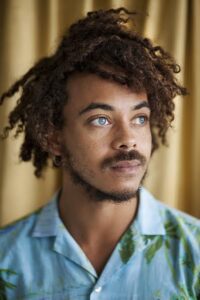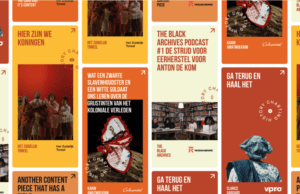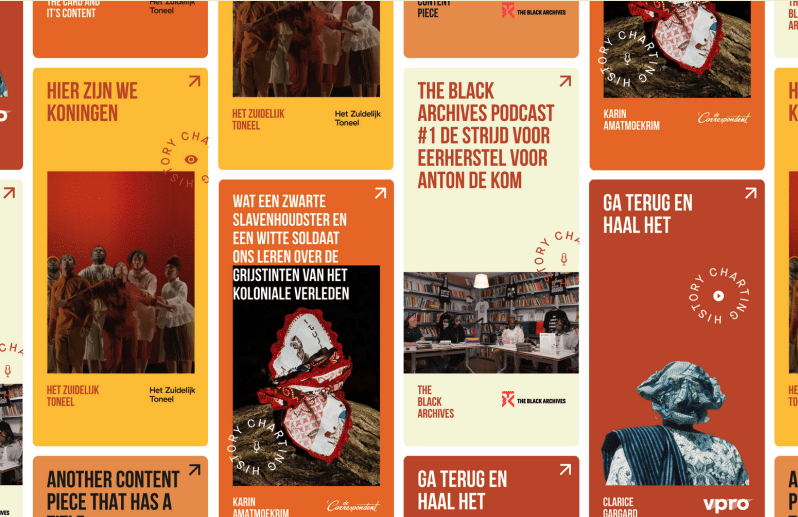 I’m not sure when I heard the term ‘Keti Koti’ for the first time. I had probably heard it early in my life, as I grew up around the corner of the Kruiskade, which is the most Surinamese street of Rotterdam. But my mother was a white Dutch woman and my father was a Black Surinamese man, who I would only meet for the first time when I turned 28. Until that moment, I knew as much about Suriname as the average white Dutch person, which is very little.
I’m not sure when I heard the term ‘Keti Koti’ for the first time. I had probably heard it early in my life, as I grew up around the corner of the Kruiskade, which is the most Surinamese street of Rotterdam. But my mother was a white Dutch woman and my father was a Black Surinamese man, who I would only meet for the first time when I turned 28. Until that moment, I knew as much about Suriname as the average white Dutch person, which is very little.
And so yes, I had heard of Keti Koti and I had noticed that on the summer day when it was celebrated, there where all of a sudden all kinds of stalls selling Surinamese food on the Kruiskade, whilst Surinamese people were parading through the streets, dressed up like kings and queens. I had always assumed it was a little festival to showcase the shop owners on the Kruiskade. I thought that, because Keti Koti sounds light and fun. Now I know it isn’t.
It literally means: ‘broken chains’ and this day is celebrated every year on the first of July. The day on which the Dutch government abolished slavery in 1863. Nobody had ever told me this. It was not taught to me in high school, I had never read it in a newspaper. I had to find out for myself, after meeting my father and by being very persistent and seeking out writers, who could explain to me where he came from and what the story was of the people that had given him life.
As a descendant of Dutch farmers, Chinese contract workers, native inhabitants of the Amazon rainforest, enslaved Africans, and, if I’m completely realistic, probably also one or two English, French, Dutch or Portuguese enslavers, this year is particularly poignant for me. Reflecting on the 150 years since the abolition of slavery in the Kingdom of the Netherlands is both a personal and communal act.
I’m also a successor to a different tradition, of many courageous writers who looked like me and used their voice to tell the world what we, as humans, could learn from history. They were writers who had to be very clever and careful when expressing themselves. Many of them were jailed, expelled from their countries of birth or, in some cases, using their voice even cost them their lives. I want to honor these people and fill myself up with their life force. That is why I wear my pangi with pride, an item of traditional Surinamese clothing that is worn during celebrations that honor the ancestors.
The first writers I found came from the United States: Frederick Douglas, Langston Hughes, Zora Neale Hurston, James Baldwin and Maya Angelou. Finding their Surinamese counterparts – Anton de Kom, George Gerardus Rustwijk, Leo Ferrier, Edgar Caïro – wasn’t very easy. Their books had been forbidden, labeled as unimportant, evil, childish or naïve, newspapers had ignored them, bookstores had put them on separate shelves and in many underhanded ways, these books had been silenced to death. I think Anton de Kom explained it best for me in his beautiful book from 1934 ‘We, slaves of Suriname’. He wrote:
“There is no better means of cultivating the feeling of inferiority in a race than this history teaching in which only the sons of another people are mentioned and praised.”
All these writers together told me how dark history had been for people who looked like me. They told me why this history is relevant, even if your skin tone is white: you cannot really understand the world we live in today if you don’t know how this world came about. They also taught me that, despite all the violence, terror and suppression, somehow enslaved people had survived. And this is why someone like me can be alive.
Somewhere in this very dark history, I understood, there was a source of light. This light is what I decided to follow. I wanted to understand where it came from and how people had managed to cling to it. For the last ten years, this research has taken over my life. Along the way I had to deal with similar opposition that my predecessors had to face. But I did find what I was looking for, which resulted in two books: Jaguarman, which was published in 2020 and a short story, Boto Banja, which was published March 2022, as The Book Week Essay.
In April and May of this year 2023, I was in Suriname, to bring these two books back to the country of my father. On the last day, I took some time for myself and while the sun was setting and tropical birds were flying overhead, I stood on the edge of the Suriname River, that once, not even so long ago, had imported six of the people that gave me life, into this country. Chained and cuffed in a ship’s hold. Overlooking the red water, I thought of a poem by American writer Langston Hughes, one of the first poems I had found ten years ago. He had written it when he was nineteen, in 1920, looking out over the Mississippi River from a train window. It felt appropriate to read it out loud to the river and to all the secrets that were buried there in the mud
“I’ve known rivers as ancient as the world and older than the flow of human blood in human veins.
My soul has grown deep like the rivers.
I bathed in the Euphrates when dawns were young.
I built my hut near the Congo and it lulled me to sleep.
I looked upon the Nile and raised the pyramids above it.
I heard the singing of the Mississippi when Abe Lincoln went down to New Orleans, and I’ve seen its muddy bosom turn all golden in the sunset.
I’ve known rivers.
Ancient, dusky rivers.
My soul has grown deep like the rivers.”
Langston Hughes was born in 1901 in Joplin, Missouri. I was born in 1984 in Rotterdam, Holland. But standing there on the banks of the river, it was undeniable that we were part of the same story. A horrible and dark, but also wonderful, epic, true story that was much larger than just the Netherlands, Suriname and the United States: a story that was about oppression and liberation, about what lies on the other side of liberation and how we, as human beings, can celebrate that.
Langston’s enslaved ancestors had been brought to stolen land called the United States. Mine had been brought to stolen land called the Colony of Suriname. But they were imported from the same coastal towns in Africa. Somewhere, on the other side of the ocean, they had been handcuffed and pushed through a narrow gate of a slave fort and onto a boat. They had been torn away from their home forever. Standing there, at the river, I felt how frightening it must have been for these people to land in this new world they would never leave, after they were finally allowed off their ships. But I also felt that the river, birds, tropical trees and the original inhabitants of this land were on their side. And I knew that they would find that out for themselves.
From the moment Africans were enslaved, anything that did not match the role the ‘master’ had devised for them could cost them their lives. The role was that of a ‘slave’ and a slave had to be physically strong and mentally weak. That did not mean that actually is what enslaved people were. It just meant they had to be twice as smart to survive: they had to learn to play a ‘slave’ on the outside, so they could remain kings and queens on the inside.
Oftentimes people will tell me: “But this is not my story, my ancestors weren’t black.”
And then I ask them: “Well, what music do you like to listen to?”
“Jazz”, they will tell me. “Hip Hop, salsa, rumba, bossa nova.” Even “Justin Bieber.”
And then I tell them: “So this story is your story already, you just don’t realize it yet.” Most of the music that we hear every day on the radio is based on rhythms that were once used by enslaved people to secretly make contact with the African gods that sailed along with them on their slaver’s ships. That we don’t realize that we are actually channeling African gods. whilst we are letting ourselves go in the nightclub is just one part of what makes this story so great.
Enslaved people found ways to safeguard their own memories, traditions and gods. Their ancient wisdoms were tested, new wisdoms added, and they found ways to be free after all their freedom was taken away. All of the lessons they learned were passed on from generation to generation, until the day would come that all of this wisdom could be shared with the rest of humanity and be brought back into the light.
That is why Surinamese people dress up like kings and queens during Keti koti. They know what a huge gift it is to be alive and how important it is to take care of what you have been given. They know that they have not been put on this Earth in order to wither. They have been put on this Earth in order to blossom and even if all your freedom is taken away from you by others, you can still find ways to blossom, because life itself is on our side.
That so many powerful forces worked so very hard to keep the lessons of enslaved people away from us, is not because their story is not relevant; it’s because we still live in a system that doesn’t benefit from us truly using our freedom. And we have so much to share and celebrate.
Keti koti isn’t a national holiday, whilst in the United States Juneteenth is. I think that is a gift to be cherished, not only by the descendants of enslaved people, but for every American. It is my hope that we will have our moment to celebrate, share, and flourish here as well. The New Anthology, amongst others, helps make this possible and connects us with each other.
This is what I want to share with you, as a descendent of people of every color and a successor to the writers that tried to make this world a better, more abundant place to improve our lives. Don’t feel shy. Don’t hesitate.
The only thing you must do with this gift of knowledge is accept it. So come, join the party and let us celebrate our magical souls and dance the dance of life.
This is the opening essay for The New Anthology project, an initiative by Are We Europe / Awe Studio, Lilith Agency and the John Adams Institute.
This essay is adapted for The New Anthology project by Raoul de Jong, edited by Clarice Gargard.



